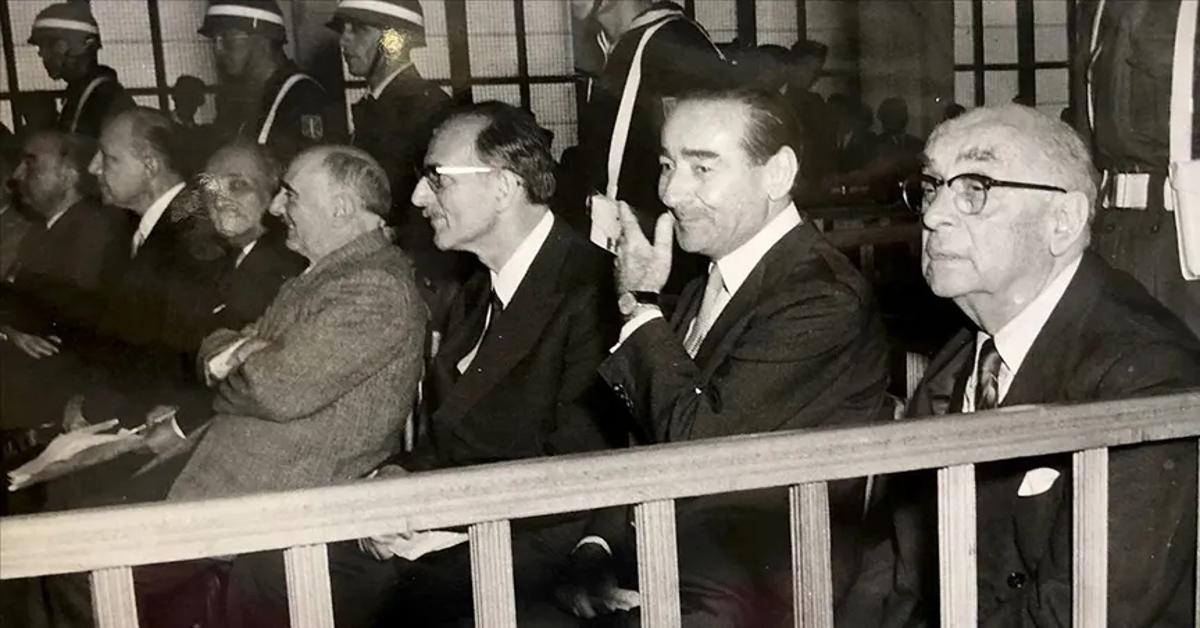
Sixty-four years have passed since the coup d'état of May 27, 1960, which resulted in the abrogation of the Constitution and the Turkish Grand National Assembly (TBMM) and the execution of then Prime Minister Adnan Menderes, Foreign Minister Fatin Rustu Zorlu and Finance Minister Hasan Polatkan. Known as one of the darkest days in Turkish democracy's history, the court details from the Yassiada trials, which the Library of the Grand National Assembly of Türkiye released online, reveal fictitious nature of the decisions taken at that time.
The Democratic Party (DP) came to power with a large majority in the 1950 and 1954 elections and initially experienced positive economic developments. However, increasing inflation and economic problems after 1955 led to instability. The fundamental tension in the DP's power-opposition relations lies in the Republican People's Party (CHP) 's identity change from its long period in power to the rapid rise of the DP to power. By frequently using the concept of "national will" and basing its power on majoritarianism, the DP caused a shift toward majoritarianism rather than pluralism in its understanding of democracy. However, economic pressures turned into political pressures, leading to increased oppression of the opposition and the press, and resorting to anti-democratic methods. Furthermore, as the reactions against the DP increased, the military regime period began with the coup on May 27, 1960. The National Unity Committee established after the coup held the authority of the legislative and executive organs, DP members were arrested and tried on Yassiada. Prime Minister Adnan Menderes, Foreign Minister Fatin Rustu Zorlu and Finance Minister Hasan Polatkan were executed. However, the country faced new crises shortly After the coup. The minutes of 19 trial files filed against members of the DP government, which was overthrown by the coup regime, such as violations of the constitution, can be examined by those interested in the court minutes of the Yassiada trials – which are also made available online by the TBMM Library.
Known for his works on legal history, Istanbul Public Prosecutor Ibrahim Cicek said the following about the trials: “Exciting things happen during the trial. The lawyers of Adnan Menderes, Celal Bayar and other defendants make various demands. Witnesses are brought to the hearings, but the witnesses are first gathered somewhere, someone listens to these witnesses beforehand. They select the ones they want and take them to the hearings on Yassıada to testify. The witnesses the lawyers want are not called to the court." Cicek noted that there were differing views among the coup plotters regarding the next steps. He further emphasized that due to legal ambiguity, a committee of professors suggested an extraordinary trial for legitimacy, leading to the establishment of the Supreme Court of Justice, historically known as the Yassiada Court. Subsequently, those released were re-arrested, and 19 cases were filed against the Menderes Government.
On the other hand, regarding the lifting of the sentences of retired generals convicted in the February 28 case due to permanent illness and old age, Justice and Development Party (AK Party) Group Chairman Abdullah Guler emphasized that the release of retired generals convicted in the February 28 case due to health reasons and old age doesn't absolve them of guilt. "They were released from prison with the approval of our President. They are not exonerated. Even if these people are released, they cannot get rid of this punishment and this crime," he stated. "They should have apologized and thanked me. But they do not accept the blame. Those with bad intentions who do not know what the country's society has become say it was normal in the conditions of that period. They have no shame," he added.
In another development, on April 11, 1990, the TBMM passed a law aimed at restoring the dignity of Adnan Menderes and his executed colleagues. As part of this law, the remains of Menderes, Polatkan and Zorlu were transferred from Imrali prison to a mausoleum on Vatan Street in Istanbul on September 17, 1990, in a state ceremony. On the 60th anniversary of the coup, Yassiada in the Marmara Sea, where 592 individuals were tried following the May 27, 1960 coup, and where Menderes, Zorlu and Polatkan were sentenced to death, was reopened as the Democracy and Liberties Island.